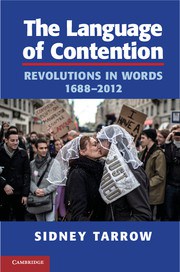Book focuses on language in social, political movements
By Kathy Hovis

Throughout history, revolutions have been won and lost because of a few choice words. Campaigns have turned on the turn of a phrase (think “99 percent”). And movements have created new meanings for popular phrases, then adopted them as mantras for their cause.
Professor Sidney Tarrow has been researching the power of words in political science and sociology for decades. His latest book, “The Language of Contention: Revolutions in Words, 1688-2012” (Cambridge University Press, 2013), examines contentious language in revolutions, at work, in gender and race relations and in nationalist and ethnic movements, and it explores how social media and technology have altered today’s political communications.
“The way people chose to frame their messages has been terribly important throughout history,” said Tarrow, the Maxwell M. Upson Professor Emeritus of Government. “Language helps to give certain concepts a continued meaning that can be communicated through the ages and throughout different countries.”
French revolutionaries were the first to think seriously about the power of words as part of their strategy, Tarrow said.
“They named things in a very systematic way to show who was a good guy and who was a bad guy,” he said. For example, the word aristocrat at the time meant someone with good manners and a genteel disposition, but soon came to be associated with greed and luxury, two things that were anathema during the revolution.
Most words that became slogans during revolutions or movements came about by accident or moved from a small local situation onto the national stage.
“What is most interesting about words that arise in a particular situation is how they diffuse to other sectors or other parts of the world,” Tarrow said. “They do so both because they have symbolic resonance, strategic modularity, or both.”
The word boycott, for example, came from a specific incident in 1880 in Ireland involving Col. Charles Boycott, who was shunned after attempting to evict tenants because of a rent dispute. “The Times of London picked it up, called it a boycott and that spread all over the world,” Tarrow said.
Tarrow said politics can’t be understood without grasping how – symbolically and strategically – words stigmatize, valorize, divide, unite and inspire political actors and action.
But words alone aren’t enough to guarantee the success of a particular movement, Tarrow said. Exploring the speed of communication possible through today’s social media and movements such as Occupy Wall Street and the Tea Party, Tarrow said working together face-to-face for common causes is still vital to making change happen.
“Today, the communication of contentious language is wide but thin,” he said. “People who don’t know each other are picking up examples of language on the Internet, but they don’t have the same goals or connections to each other (as did activists in earlier movements).”
Being physically together, struggling through adversity at a sit-in or a march produce solidarity, Tarrow said.
“It’s easy to get people to turn out once,” he said, “but more difficult to get them to remain part of an organized movement.”
Tarrow is also a visiting professor at Cornell Law School, the author of “Strangers at the Gates: States and Social Movements in Contentious Politics” (Cambridge University Press, 2012) and a book in progress on the relationships between war and social movements for Cornell Press. His book “Power In Movement” (Cambridge, 2011) is a standard text for advanced students in political science and sociology.
Kathy Hovis is a writer for the College of Arts and Sciences.
Media Contact
Get Cornell news delivered right to your inbox.
Subscribe